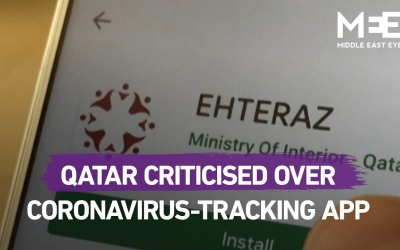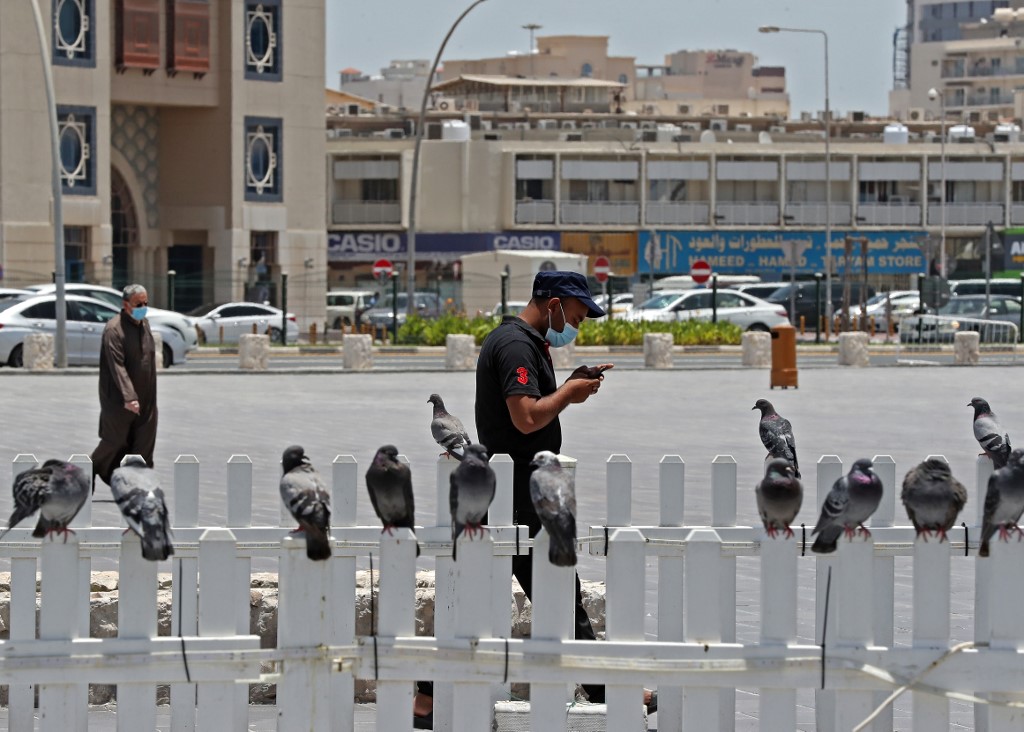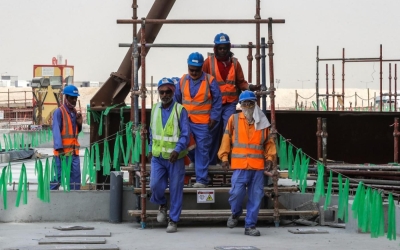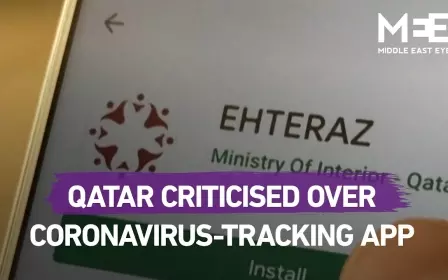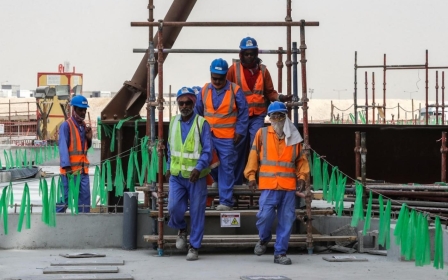Coronavirus: Qatar contact-tracing app exposes divide between rich and poor
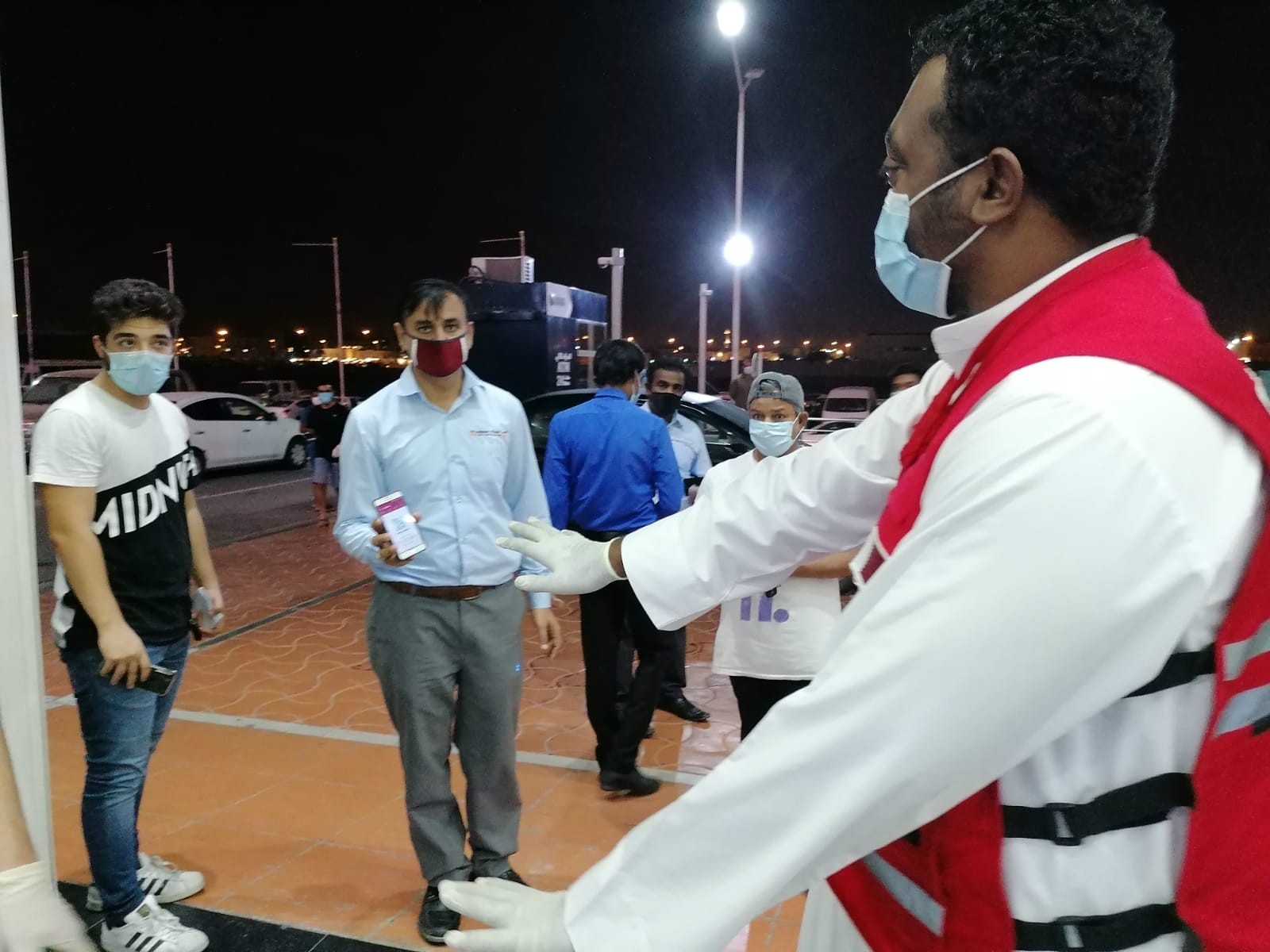
As Qatar prepares to slowly lift its coronavirus restrictions in four phases starting from Monday, new concerns are being raised about the Gulf nation's contact-tracing app and its threat to users' privacy.
Last month, Amnesty International revealed serious security vulnerabilities in the Ehteraz app, meaning "precaution" in English, saying it had potentially exposed the personal details of a million people.
Although the flaw was fixed the next day, the UK-based organisation also called on authorities to reverse the decision to make use of the app mandatory.
Following an amendment to Qatar's law on disease prevention, not having the app installed on your phone could lead to a maximum fine of QR200,000 ($55,000) or three years in prison.
Developed by a private firm for Qatar’s interior ministry, concerns over privacy have been raised since the app requires access to files on the phone and permanent use of its GPS and Bluetooth for location tracking.
The app's simple interface displays coloured QR codes containing the user's ID number - green for healthy, red for Covid-19 positive and yellow for quarantined cases.
Grey indicates suspected cases or those who have come into contact with infected individuals.
New reality
Although Qatar made use of the app mandatory on 22 May, most people were still remaining at home at the time.
However, when last Thursday authorities allowed people to exercise in the open without masks and more people took to their cars, the realities of needing the app started to bite.
Many people's handsets do not support the app, which uses Bluetooth Low Energy (BLE) to use up less power and data.
As a result, mandatory use of the app has forced many people to buy new smartphones and discard their lower-specification ones.
Even with BLE, the app drains the battery 20 percent more than normal, a developer linked with the private firm that built it for the ministry said in an unofficial video last month.
According to the developer, the app can detect and pass an encrypted code to the users if they ever came within one and a half metres of a Covid-19 case.
Later the app transmits the data to the health authorities.
Stop and search
Meanwhile, police have adopted a stop and search policy, with several motorists saying the police had asked them to show the app running.
Sajad Sahir, an unemployed graphic designer, said he stayed at home at the weekend after his friends told him of the intensive police inspections on the road.
Unable to install Ehteraz because he was using Apple's iPhone 6, Sahir called the app's helpline.
"They told me the only way out is to buy a new phone," said Sahir.
On Sunday, he bought a new phone costing QR360 ($99) from a kiosk at the LuLu Hypermarket on the capital Doha's Mathar Qadeem street.
He said the same handset priced QR10 lesser was sold out in Ansar Gallery, a nearby shopping centre.
One grocer in Muaither, some 19km from Doha, who also uses an iPhone 6, told MEE he had not gone out anywhere for fear of being caught.
"A regular patron called me last week to check if all my staff have the app installed," he said. "I said yes, but I didn't tell him that I didn't."
He has money to buy a new phone but is afraid to go out and buy one.
He says there are two risks if he goes out to buy a phone, one is being caught by the police, the other is being caught by the coronavirus.
"I didn't even go out to buy a shirt for Eid because I was afraid to touch things someone else tried," he said
Last week, he said, he needed repair work to be done for his air conditioner, but the mechanic refused to come as he did not have a phone with Ehteraz.
Borrowing money
Jaseem Cherapuram, a construction engineer who had tested positive for Covid-19 and is now disease-free after three week's home quarantine, said many friends in his bachelor villa had had to borrow money to buy a compatible smartphone.
In Mathar Qadeem Street, Jamseer TC, a partner of the Madrid Supermarket, said he bought a phone for the shop's delivery boy.
The phone cost him QR465 ($128) but he still could not run the app initially because it wrongly said his residency permit had expired.
The same thing happened with another person MEE spoke to but the issue has since been solved.
Unsurprisingly, the implementation of the app is creating a minor spur to the country's smartphone business which has been heavily hit during the lockdown.
Qatar's two major wholesale markets, Alwatan Centre and Al Gharafa Souk, have been closed since 15 March.
Plaza Mall, a retail hub of over 200 hundred kiosks located in Asian Town, where many labourers live, is also closed.
Mobile phone kiosks share space with electronics shops at the mall to save on rent.
To ease their burden, the mall owner has waived the rent since April, a mobile phone dealer told MEE.
"We have asked for another month's waiver when we start business," he said.
The dealers now take orders through phone calls, websites and social media and do door to door delivery for customers.
The dealer says he and his competitors sell phones at a discount to attract customers who are low paid workers and in order to beat rival sellers.
"Sometimes we even give discounts up to QR150 ($40) for phones such as Samsung A51 whose retail price is over QR1000 ($275)," he said.
He said he had sold a few cheaper Android Redmi 7 handsets to customers who had wanted Ehteraz on the phone.
Kabeer Pariyaram, another Plaza Mall seller, said he had sold around a dozen of the same phone last weekend.
Visitors' frustrations
The interior ministry's decision to expand the app's user base has also highlighted the issue of thousands of visitors stranded in Qatar.
While such visitors are also in a similar situation in other Gulf states, Qatar currently hosts a particular category of visitors who arrived visa-free.
Visa-free entry for over 80 nationalities was brought in to offset the loss of tourists after the boycott of Qatar by three neighbouring countries in June 2017.
The move had been a godsend for sections of the country's two million expatriate workers, many of whom brought in their parents, spouses and children to stay with them for a few weeks.
Many of the visitors now feel they have overstayed their relatives' welcome and the restrictions inside Qatar were making their trip increasingly dull.
App update
On Sunday, Qatar rolled out an update which enabled stranded visitors to download the Ehteraz app.
Up until then, only citizens and residents with a valid ID could download it.
Even last week, a source in the interior ministry had ruled out the possibility of the app's access to visitors because health authorities "don't have a proper tracking system based on the visa number".
In Qatar, the country's health card is linked to their ID and visitors to the Gulf state rarely go to hospitals and have their records added to the healthcare system.
The update will also benefit those whose resident permits have expired and those who are banned from travelling.
On Wednesday, the interior ministry source said the change was likely due to entry restrictions that had been put in place by some businesses last week.
Before returning, visitors often buy dry fruits, dates and electronic goods, a custom nurtured over decades.
Several banks and shopping outlets were now asking customers to show a green QR code on their app, a sign they were healthy, before allowing entry.
"Rolling out the app to visitors without their health record in the system can slightly affect the efficacy of the outcome," the source said.
Businesses across Qatar are now pinning their hopes on the second phase of the lifting of the lockdown lift on 1 July, which promises the opening of malls and wholesale markets, although still with some restrictions on timing.
Mobile phone shops beyond such premises, along with some other types of shops, will be allowed to open in the first phase of the lifting of the lockdown on Monday.
Middle East Eye delivers independent and unrivalled coverage and analysis of the Middle East, North Africa and beyond. To learn more about republishing this content and the associated fees, please fill out this form. More about MEE can be found here.



